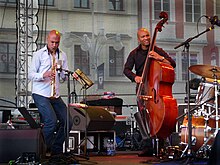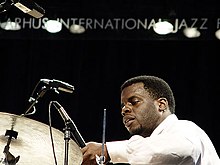Come What May
| Come What May | ||||
|---|---|---|---|---|
| Joshua Redman's studio album | ||||
|
Publication |
||||
| Label (s) | Nonesuch Records . | |||
|
Format (s) |
LP, CD |
|||
|
Title (number) |
7th |
|||
|
running time |
43:08 |
|||
| occupation |
|
|||
|
Studio (s) |
Sear Sound, New York City |
|||
|
||||
Come What May is a jazz album by the Joshua Redman Quartet. The recordings were made on May 8 and 9, 2018 in New York and were released on Nonesuch Records in March 2019 .
background
In Joshua Redman's quartet, Aaron Goldberg played piano, Reuben Rogers played bass and Gregory Hutchinson played drums. His last recording with this staff is in 2000, and they played Trio Live (2014) as a piano-less trio (excluding Goldberg ). Redman, Goldberg, Rogers and Hutchinson were on tour constantly from 1998 to 2001 and stayed in touch. Redman had written compositions for them again in 2014, but it was not until October 2018 that they went back into a studio to record the seven pieces on this album.
Track list

- Joshua Redman Quartet - Come What May ((Nonesuch Records 585291 2)
- Circle of Life 6:55
- I'll Go Mine 7:14
- Come What May 6:45
- How We Do 3:31
- DGAF 4:47
- Stagger Bear 6:02
- Vast 7:48
- All compositions are by Joshua Redman.
reception
The album received a Grammy nomination in the Grammy Award for Best Jazz Instrumental Album category in 2019 .
According to Johannes Kaiser ( SWR 2 ), the album exudes a classic perfection and looks like it has been cast from a single source. Redman proves "once again in which league he plays."
Matthew Kassel ( JazzTimes ) said Joshua Redman's excellent new album marked a kind of homecoming. He plays with a flawless rhythm section , thanks to many years of experience the quartet sounds wiser and more confident. Although Redman is the leader, he treats the group like a democratic institution and gives plenty of solo space to his bandmates, especially Goldberg, whose dark, low-set vamps created a mysterious mood at the beginning of several songs. Rogers laid a solid foundation with his resonant bass lines, while Hutchinson provided movement with his ride cymbal and crackling snare hits.
Sebastian Scotney (London Jazz News) particularly praised Aaron Goldberg's touch and articulation on the piano on this album. The rhythmic independence and the complementarity of the hands in his solo on “I'm Go Mine” is something special. There are very different grooves on the album, and the appeal of this album lies in its diversity.
Matt Collar gave the album four (out of five) stars in Allmusic and wrote that every musician has a wealth of experience and brings it to his work. In a way, Come What May provides an intimate counterpoint to the saxophonist's 2018 album Still Dreaming , in which he referred to his father Dewey Redman's work with Ornette Coleman in the 1970s and 80s. In contrast, Come What May feels more relaxed - like “a relaxed meeting between old friends”. Many of the songs here have a dance quality, like the three-quarter-bar "Circle of Life", whose kaleidoscopic energy is reminiscent of Dave Brubeck's work. Similarly, when you think of “Stagger Bear” with its bluesy piano, think of Bob Fosse's cabaret boast . The humorous title "DGAF" also has a kinetic sense of movement, as Redman drifts through the contrapuntal, klezmer-like structure of the song. During the more reflective moments of the album, like on the wavelike “Vast” and the plaintively earthy title track, Redman achieves a more relaxing apotheosis. In those moments when his saxophone is in the empathic embrace of his band, Redman evokes the feeling of letting go and immersing himself in a soulful reverie in the late afternoon.
According to Brian Payne ( Jazz Journal ), it is clear that the quartet has developed a mutual empathy over the years they have played together. Although Redman is in the spotlight here, he does not play the others on stage and they are given a generous solo space in which they can demonstrate their agility and improvisational talent. While there are clear changes in mood and tempo in the music, there is a certain similarity throughout. In Payne's view, this is due to Redman's predominant use of the minor keys, which create a touch of melancholy that permeates the album.
Individual evidence
- ↑ a b Sebastian Scotney: CD Review: Joshua Redman Quartet - Come What May.London Jazz News, May 3, 2019, accessed on December 13, 2019 .
- ^ Brian Zimmerman: The 2020 Grarmy Jazz nominees. Jazziz, November 26, 2019, accessed December 7, 2019 .
- ↑ Johannes Kaiser: "Come what may" by saxophonist Joshua Redman. SWR, April 5, 2019, accessed on December 13, 2019 .
- ^ Matthew Kassel: Joshua Redman Quartet: Come What May (Nonesuch). JazzTimes, April 3, 2019, accessed December 13, 2019 .
- ^ Review of the album at Allmusic (English). Retrieved December 13, 2019.
- ↑ Brian Payne: Joshua Redman Quartet: Come What May.Jazz Journal, June 28, 2019, accessed December 13, 2019 .
